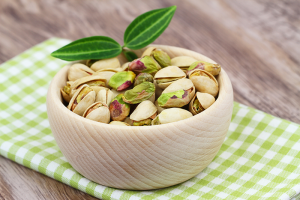 Every December, my husband and I get a gift tin of roasted pistachios from my aunt. No surprise, they’re gone in a day, what with the way we swarm and crack and devour the tasty kernels.
Every December, my husband and I get a gift tin of roasted pistachios from my aunt. No surprise, they’re gone in a day, what with the way we swarm and crack and devour the tasty kernels.
Not too long ago, Auntie’s tin would have provided our pistachio fix for the year.
But these days, December isn’t the only month we eat pistachios. Along with almonds, walnuts, cashews and other nuts, pistachios play an important role in our weekly diet — perhaps even a starring role.
We frequently reach for pistachios because they’re so good for hearts. Numerous studies have shown that pistachios in particular can help reduce bad cholesterol and that the omega-3 fatty acids present in pistachios can help lower blood pressure and protect against abnormal heartbeat. What’s more, pistachios are rich in L-arginine, an essential amino acid that makes arteries more flexible and less susceptible to blood clots. On top of everything, pistachios contain a decent amount of cholesterol-lowering fiber.
If you’re worried that pistachios — and their high fat and calorie content — are bad news for health and weight, it’s time to refresh your thinking. Most of pistachios’ fat is good-for-you unsaturated fat; and, relative to other nuts, pistachios have fewer calories than most (about 160 per 50 kernels). According to a Harvard study, in fact, frequent nut eaters were less likely to gain weight. “Nuts are high in protein and fiber, which delays absorption and decreases hunger,” said physician Frank Hu, professor of nutrition and epidemiology at the Harvard School of Public Health.
Compared with other nuts, pistachios boast a roster of nutrients and are an especially good source of protein, vitamin B6, copper and manganese. And while pistachios may not pack the antioxidant punch of walnuts or pecans, they do dish out two antioxidants—lutein and zeaxanthin—that promote eye health.
Pistachio-Crusted Chicken
Breasts with Zesty Yogurt Sauce
Serves 4
¾ cup shelled pistachios
¼ cup whole-wheat breadcrumbs (suggest panko)
1 teaspoon garlic powder
½ teaspoon paprika
½ teaspoon ground cumin
¼ teaspoon cayenne pepper (optional)
½ teaspoon kosher salt
¼ teaspoon coarse black pepper
2 large boneless, skinless chicken breasts (sliced in half, horizontally)
½ cup plain Greek yogurt
1 tablespoon fresh lemon juice
1 teaspoon lemon zest
1 tablespoon olive oil
1 clove garlic, minced
½ teaspoon ground coriander
salt and pepper to taste
¼ cup chopped, roasted pistachios
Preheat oven to 400 degrees F. Lightly oil baking sheet (if using a baking rack, line sheet with foil and then lightly oil rack). Finely grind nuts in food processor. Add breadcrumbs and all the spices up to the chicken breasts and blend, using on/off turns. Transfer mixture to a plate.
Coat chicken with nut mixture (lightly pressing mixture into chicken), and place on prepared baking sheet or rack. Bake until cooked through, about 20 minutes. Let rest for 10 minutes, then slice into thin strips (if desired).
While chicken is cooking, whisk together remaining ingredients for yogurt sauce; season with salt and pepper. Serve chicken on a bed of fresh or sautéed greens; drizzle with sauce; garnish with chopped pistachios.
Helpful Tips
Monitoring your weight? Sodium intake? Opt for unsalted pistachios in their shells (studies show you’ll eat less). When buying in bulk, look for pistachios that have their shells opened at one end and an intact kernel (the greener the kernel, the fresher the nut). And take a whiff: If they smell off, they’re probably rancid. Pistachios will last longer when stored in a cool, dark, dry place. They can also be stored in the fridge for up to 6 months or the freezer for up to a year.
Anne Palumbo is a lifestyle columnist, food guru, and seasoned cook, who has perfected the art of preparing nutritious, calorie-conscious dishes. She is hungry for your questions and comments about SmartBites, so be in touch with Anne at avpalumbo@aol.com.

